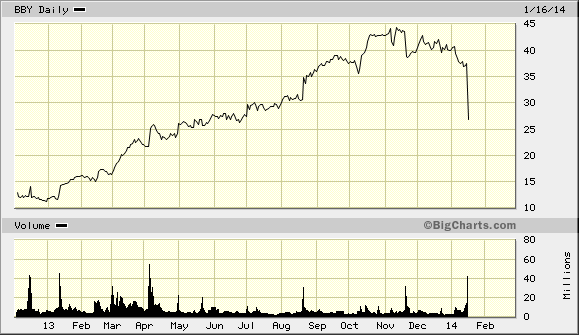Best Buy (BBY) saw its share price plummet by 29% on Thursday after reporting that same store sales during the holiday season had fallen about a percent from the year before.
Now, Mr. Market has been known to overreact to disappointing sales data, but Best Buy’s share price collapse seems a little extreme; a 29% drop after a 0.9% sales decline seems a little out of proportion.
So, what gives? Alas, Best Buy’s announcement shattered investor hopes that the chain had reversed its fortunes and figured out a viable business model in the era of electronics showcasing and cheaper online competition. Best Buy had made a herculean effort over the past year, changing its floor plan and experimenting with a store-within-a-store strategy. But as the holiday results proved, Best Buy is fighting a battle it’s going to have a very difficult time winning against cheaper online rivals and an increasingly savvy customer base that knows how to find deals.
Meanwhile, JC Penney (JCP) bowed to the inevitable and laid off 2,000 workers and closed 33 stores. I recently wrote about Penney and recommended it as a short. The stock is now down by a third from its late November highs, and any investor hope for a turnaround has quietly melted away.
So, what conclusions can we reach here? In an environment in which working and middle class Americans are suffering from high unemployment and stagnant wages and in which internet competition is a constant threat, are retail stocks doomed to constantly disappoint?

Not at all. Sure, marginal players like JC Penney will fail; I don’t expect JCP to survive through 2015. And Best Buy’s struggles are far from over, though I expect that Best Buy will survive. They will, however, have to continue experimenting with new business models before they find something that works. Best Buy is dirt cheap at 0.27 times earnings, but I would wait until the current selling is exhausted before considering it for investment.
One retailer that I would recommend right now is Wal-Mart (WMT). Yes, Wal-Mart is facing online competition from Amazon.com (AMZN). And yes, Wal-Mart has the same issue that JC Penney does in that its core customers are hurting economically. Yet Wal-Mart trades at a very attractive 13 times earnings and 0.5 times sales. It also yields an attractive 2.4% in dividends and has been aggressively buying back its stock. And while Wal-Mart is not seeing the growth it once did, unlike many of the other struggling retailers, Wal-Mart is actually able to grow its top line revenues. It also happens to be the only company with the logistical infrastructure in place to compete with Amazon.
Are you going to double your money in WMT in 2014? Probably not. But I do expect it to outperform the broader market given its low price and the generally bearish sentiment towards the stock by investors.
Action to take: Buy Wal-Mart and plan to hold through the end of 2014. Use a 15% trailing stop.




